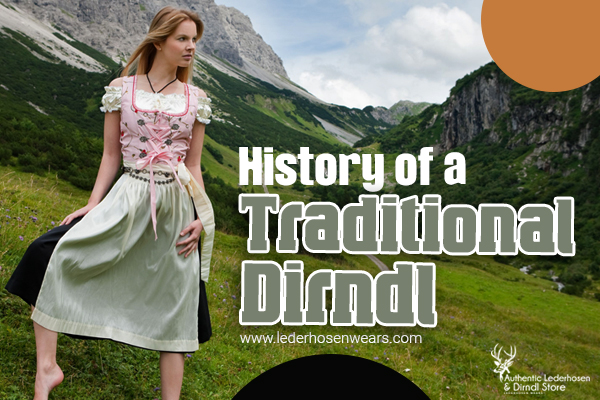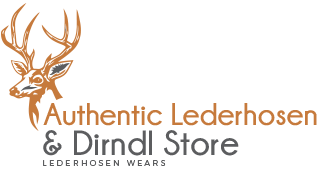
History of a traditional dirndl
16/03/2021 | Harris
The dirndl is regarded as a folk costume (in German Tracht). It developed as the clothing of Alpine peasants between the 16th and 18th centuries. The word dirndl originates from the term ‘diernen’. That’s what the ladies who worked on farms in Bavaria and European country were referred to as within the nineteenth century. The subsequent typical clothing was worn: ladies donned a ‘leiblgwand’ over their shirt. This is we tend to currently acknowledge as a dirndl dress.
An apron was worn over the dress that looked
very little within the method of today’s elegant versions. In old days,
linen was accustomed create aprons rather than velvet and cloth. If you were
lucky, your dirndl may even have boasted a semi fashionable pattern.
Floral and plant structure patterns
were naturally a feature of some dresses, however most dirndl aprons were easy
and monotone. Nowadays, dirndls failed to accompany their user to Oktoberfest
or different people festivals, however rather once cleansing, operating in
stalls or in fields.
Anatomy of a Dirndl
The History of the Dirndl is incredibly complicated and multilayered, very like the dress itself and whereas stitching techniques have evolved, it's still celebrated and sometimes worn the method it had been within the eighteenth and nineteenth centuries. Whereas the outfit is created of four separate items - the skirt, the bodice, the blouse and an apron.
Nowadays it's conjointly common for the top and skirt to be sewed
together as one dress, while not fixing its overall look too greatly. The
quantity of each ability and work that goes into stitching a Dirndl implies lot
of elaborate ones, and ones created mistreatment ancient ways, will value
anyplace from a whole bunch to thousands of dollars for the whole outfit, and
once seen in the person, you may perceive why!
Below is a brief breakdown of every separate half, thus you'll be able to get a sneak peek into what extremely goes into this beloved outfit.
Dirndl Skirt
The skirt was historically an ankle length
skirt, created full by pleats or cut as a circle skirt and using several yards
of cloth for this half alone. Variations to the line have happened as every
advance of the Dirndl leaves its mark on the dress. However most ordinarily
currently the dress is mid length, sitting slightly below the knee. There’s
after all conjointly the mini Dirndl that has been fashionable for a few time
at Oktoberfest, however, this length is incredibly untraditional and worn most
notably by tourists and youth.
Dirndl Top
The top of the Dirndl is
historically become independent from the skirt and follows fashionable
Victorian silhouettes. The fitted and low cut top usually options a square or
scooped neck, usually with boning and closed mistreatment either lacing or hook
and eyes, or ordinarily currently, invisible zippers.
Details on the top will vary;
however usually involve some form of piping, embroidery, and a Froschgoscherl
trim (those stunning origami like, cloth rosettes) round the neck and drawing
attention to the neckline. If you're feeling inspired by this, find these
embroidery machines, the chances are endless.
Dirndl Blouse
The blouse isn't your usual blouse either. It designed specifically to be worn beneath the Dirndl and is cropped to sit down slightly below the bust, thus as to not produce unneeded bulk beneath the tightly fitting top of the dress. Traditionally these blouses are plain white, or less ordinarily, black cotton usually with puff sleeves and a plunging sweetheart or square neckline. Because the blouse is generally coated, the main points get in the elements that are visible, particularly the neck and sleeves that usually gathered and adorned.
Dirndl Apron
The Apron is the final bit to the
Dirndl and isn't to be forgotten. Once worn primarily for function, but less
thus currently, the apron options a smocked or cartridge folded front that ends
some inches shorter than the skirt, with a giant sash tied in a very bow either
at the front or back.
Legend has it, wherever you tie your
bow reflects your marital status, and though this can be not believed to be
traditionally correct, it's maybe still value knowing if you intend to wear one
to any future celebrations! According to the official Oktoberfest website a bow
tied to your front left signifies you are single and interested in dating, or
if tied to the right you are either married, in a relationship, or not
interested!
Suddenly on trend the dirndl - cuts a good figure
In the 1930s, there was a huge hype around dirndls. Town women who traveled to the mountains for relaxation found them quite likeable the maids’ ‘look’ — after all it needed a makeover appropriate of them. In Germany, the trashy bouffe ‘The White Horse’ with Theo Lingen conjointly contributed to the dirndl’s new found quality.
The same applied to the USA wherever ‘The White Horse’ was a box workplace hit on Great White Way, running 223 times and adding to dirndl mania. Suddenly, traditional costume was hot and anyone who wished to showcase the newest fashion trends was absolute to be seen in a dress with traditional style features.
Summer versions of the dirndl assumed puffy sleeves, bodices and aprons whereas winter models had extra heat flannel in loden green and dark blue.
Every region offers its own unique take on the dirndl
Two dirndls are never same. Over
time, regional and native variations began to emerge, creating every traditional
look distinctive. In Passau in lower Bavaria, a golden hat is worn with ancient
costume. Though it’s comparatively near to Passau, in tranquil Hinterskirchen
different details take center stage.
Ladies there not solely wear blue knee high socks. However they conjointly wear a little crown — the latter solely applies to single women. However Fashionable dirndl wearers in upper Bavaria, on the other hand, usually team their dirndl with a choker. The final look is always a unique mix of tradition and personal taste.
At our store, you can grab the best
traditional dirndl dress at low prices. You can choose from a broad range of styles, colors, and prints.
We assure you that even within a low price range, you will get the highest
quality, durable, and beautiful dirndl dress.
For Oktoberfest 2021 dirndl outfits, shop now at our store Lederhosen Wears.
